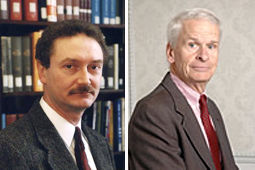Leading Libya, Yemen scholars to present views
Analysts with deep experience will look at the countries' revolutions and reactions

Dirk Vandewalle, left, and Charles F. Dunbar
Libya and Yemen are at or near the top of the news every day. The media is filled with minute-to-minute reports of battles, demonstrations and negotiations struggles between entrenched authoritarian rulers and determined protesters.
Yet it is clear that there is a dearth of in-depth information around about the two countries, either one of which could prove pivotal to the future of the democratic movements that are profoundly shaking the Arab world.
Leading authorities on Libya, Yemen and the broader region will analyze and comment on recent and longer-term developments on campus Wednesday, April 13, through the efforts of the Program on International and Global Studies, the Crown Center for Middle East Studies, the Politics Department and the newly-formed Brandeis International Journal.
Dirk Vandewalle, who teaches in the Government Department and at the Amos Tuck School of Business at Dartmouth College, is the dominant American scholar of Libya. The author of two books on the country, "A History of Modern Libya" and "Libya Since Independence," Vandewalle also is editor of "Qadhafi's Revolution 1969-1994."
Charles F. Dunbar, a professor of international relations at Boston University, is a former United States ambassador to Yemen (1988-1991) and to Qatar (1983-1985). He was chargė d'affaires at the American Embassy in Kabul, Afghanistan from 1981 to 1983, and also was assigned, in the course of his 31-year State Department career to U.S. missions in Iran, Morocco and Algeria.
Both professors have expertise in Middle East economic and policy issues. Their discussion will be moderated by Eva Bellin, the Myra and Robert Kraft Professor of Arab Politics, who is an authority on Tunisia.
The program begins at 6:30 p.m. in the atrium of the Mandel Center for the Humanities.
Vandewalle, whose research and teaching focus on comparative economic development in emerging economies and economic reform in the Arab Gulf states, North Africa and Asia, has been one of the most sought-after analysts of Libya in the world since the outbreak of the rebellion against the country's longtime dictator. He is coming to Brandeis at the invitation of Chandler Rosenberger, assistant professor of sociology and chair of the International and Global Studies (IGS) Program.
The professors became acquainted because both have been fellows of the Institute of Current World Affairs, an organization which finances long-term fellowships to provide "promising individuals with an opportunity to develop a deep understanding of an issue, country or region outside the United States and to share that understanding with a wider public."
Rosenberger, whose fellowship was in eastern Europe, met Vandewalle, whose fellowship was in Libya, in Washington during the 1990s, at the institute's annual fellows' meeting.
"We meet every year in D.C. to talk about the work of people who are returning from work abroad and about our special areas of interest," said Rosenberger, who is actively encouraging Brandeis students to apply for the fellowship. "What's wonderful about the organization is that - like IGS - it brings people from different areas together to compare and contrast" conditions in countries around the world.
Vandewalle recently has published an op-ed on Libya's leader in the New York Times and a commentary on Western policy toward him in Foreign Affairs.
In addition to the Mandel Center program, he will speak at the Global Affairs Table, a project of the Wien Scholars, from 11:30 a.m. to 1 p.m. on April 13. Online RSVPs are requested for that event, which will be held in International Lounge.
Dunbar comes to campus at the invitation of the Brandeis International Journal, an impressive new student-run foreign affairs publication, the first issue of which will be distributed in conjunction with the Libya-Yemen forum.
"The idea is to have a publication for students who want to talk about political developments going on around the world," says Karia Sekumbo '14, the founder and first president of the journal. "Lots of students here are very interested in international politics. We are trying to develop a section for each region of the world, to encourage people to read about different areas as well as area they are interested in."
Sekumbo, a David Scholar from Tanzania is a prospective double major in international and global studies and economics.
Categories: Humanities and Social Sciences, International Affairs






